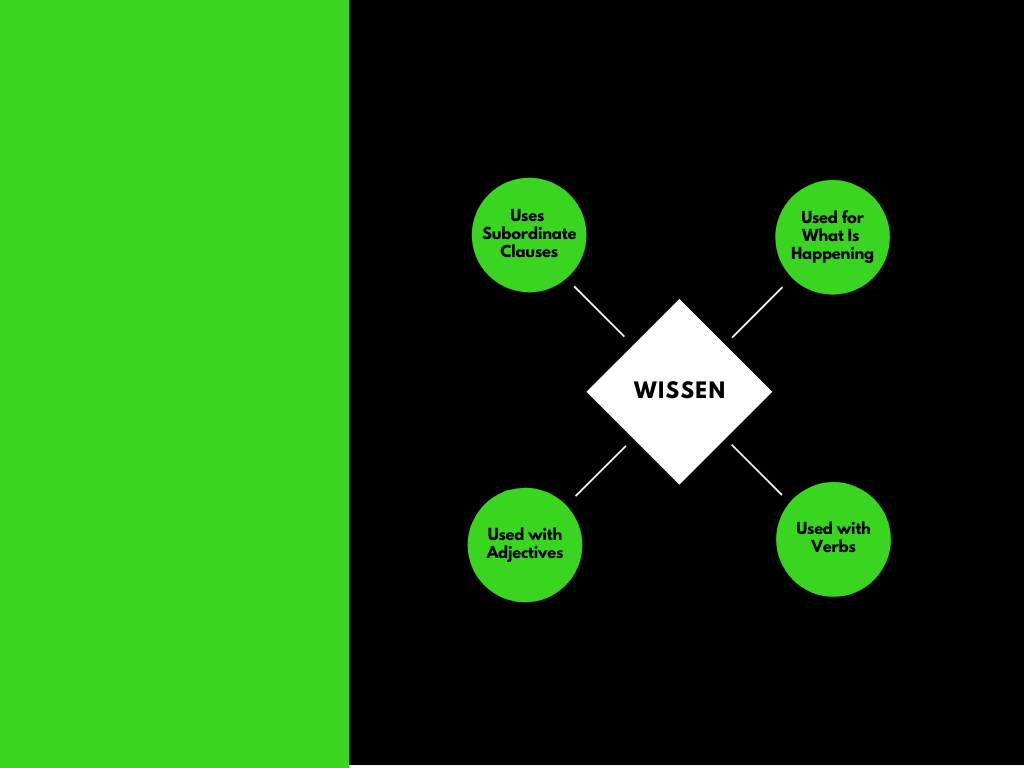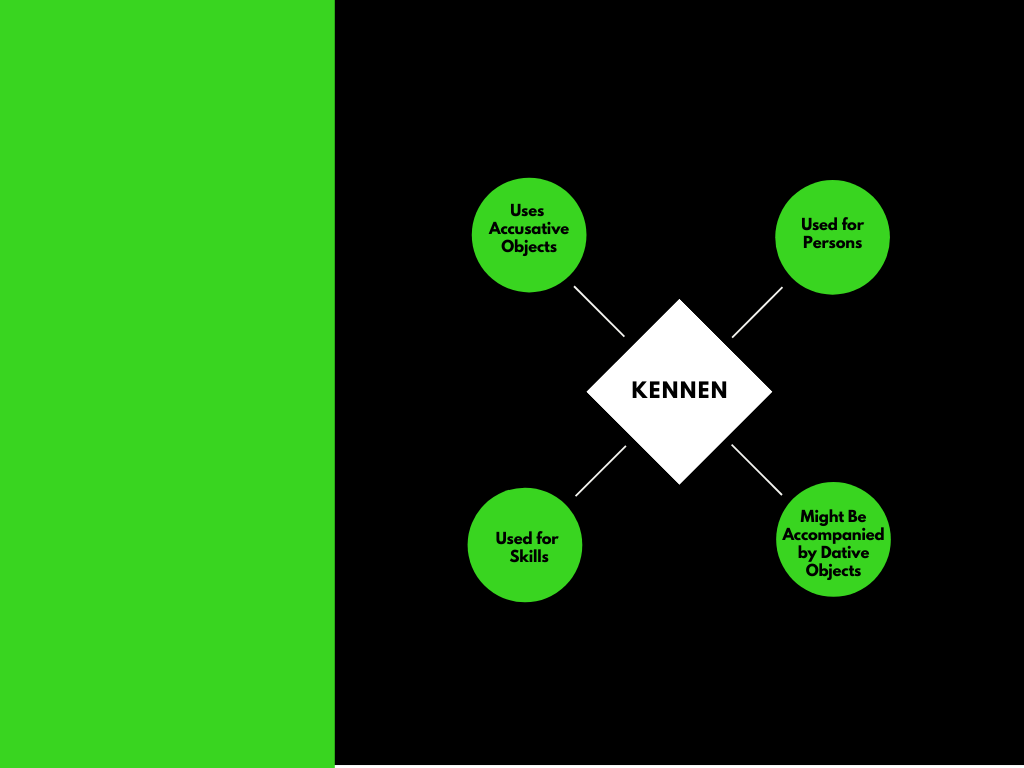When my girlfriend started out with learning German she often confused the verbs kennen and wissen so I want to help you avoid these mistakes.
Können is used with a direct object and therefore requires you to use a noun in accusative, while wissen is used for talking about verbs and adjectives. Wissen requires you to formulate a subordinate clause instead of using accusative. If you talk about a skill you should use neither of them and use können instead.
Did you know that in old English there also were two verbs for to know? No? Me neither, it is interesting what you can learn by writing a blog.
If you are interested in this you can search for the word witan, which by the way is closely related to the German word wissen.
I won’t go in depth about this since this article is intended to be about German and I m sure there are professionals that covered the topic of witan elsewhere.
Using A Verb or An Adjective

I wrote in another article that you can easily make a noun out of every German verb. We will use this to help us to understand the difference between kennen and wissen.
The noun which belongs to wissen is das Wissen (= knowledge). Great but how does this help us? Let me explain.
Whenever you are talking about some fact that you know, or some knowledge that is in your brain, you will have to use wissen.
Apart from that it will help you to know that wissen can be used together with adjectives and verbs.
You are able to say things like, I know how to drive a car, I know that cars are fast. All of these things cannot be expressed by kennen in German.
You will also have to use wissen if you want to talk about an adverb. I will talk about this in the next paragraph.
Ich weiß, wie das Auto aussieht
I know how the car looks like
You know the exact color of the car and you are talking about a fact (at least you think that it is a fact, it doesn’t have to be true at all).
If you want to use kennen to say the same thing you would have to talk about the color of the car itself. (Ich kenne die Farbe des Autos = I know the color of the car)
Ich weiß, dass der Baum groß ist.
I know that the tree is big
You are talking about an adjective (big) here so you also have to use wissen. If you want to use kennen, you will have to change the structure and make a noun out of the adjective.
For example: I know the size of the tree (Ich kenne die Größe des Baums)
Ich weiß, dass Deutsch nicht leicht ist.
I know that German is not easy.
This one is tricky, you are able to say this with kennen as well, but it will sound bad (even though it will be grammatically correct) You could, for example, say something like: Ich kenne die Schwierigkeit der deutschen Sprache.
Ich weiß, was du meinst.
I know what you are talking about.
Meinen is a verb so you need to use wissen again. You can rephrase this to use kennen by changing the verb to a noun (meinen → die Meinung).
You would say: Ich kenne deine Meinung. (This isn’t „good“ German, but correct German)
You might have noticed that there is a special way that all these phrases are structured. They all use subordinate clauses and this is another clue which can help you identify which word you should use.
In German, the word wissen always has to take a subordinate clause except for one situation. If you already talked about something before and you can substitute it by das.
Ich weiß das.
I know that
Ich weiß es.
I know it.
Even though this exception exists, it will most likely be used to answer to some question and the person asking this question will already indicate through his question, which verb you need to use
Weißt du was wir essen werden?
Ja, ich weiß es.
Do you know what we are going to eat?
Yeah, I know it.
Knowing What Is Happening Right Now
Wissen can also be used to express what is going on. For example:
Ich weiß was gerade passiert.
I know what is happening right now.
Ich weiß, dass er gleich losfährt.
I know that he will start to drive soon.
Weißt du, wieviel Uhr es ist?
Do you know what time it is?
In this case we would also have to use wissen because we are again talking about some more specific fact that is related to what is happening right now.
We are again talking about verbs (passieren, losfahren) and adverbs (wieviel).
We can rephrase all these sentences to use kennen, but then we have to specificly talk about the noun.
Knowing Objects And Persons

The knowledge about things is expressed by the verb kennen and the sentences that you form with kennen will have a noun as their object. Whenever you use kennen, you will only mention a noun afterwards.
Of course you are able to describe this noun or object further by using relative clauses, but the object of the main clause will be this noun.
Let’s look at some examples:
Ich kenne den Mann.
I know the man.
Ich kenne die Uhrzeit.
I know the time.
Ich kenne dieses Haus.
I know this house.
As you are easily able to see, we are purely talking about nouns here. On top of that, kennen is a verb which forces the usage of an accusative object afterwards. You can add some specifying words so that genitive will be use after kennen but it is still referring to the accusative object.
Ich kenne des Mannes Haus.
I know the house of the man.
This example is very unnatural and you simply will not encounter this way of using kennen (even though it is grammatically correct)
The main takeaway here is that you are talking about a specific thing or person, that you know.
Knowing A Skill
So we talked about nouns, verbs and adjectives so far, but what about skills? Of course you can say:
Ich weiß, wie man Fahrrad fährt.
I know how to drive the bicycle.
While this is grammatically correct, we would not phrase it like this in German. In German, when talking about skills, or being able to do something, you would rather use the verb können.
So the above mentioned phrase would be said in this way:
Ich kann Fahrrad fahren.
I am able to drive the bicycle.
Conclusion
Even though kennen and wissen might seem very close when you initially look at them, they are still two very different kind of verbs. Each of them has its own grammatic structures that have to be used with them and they are easily distinguishable from each other.
Whenever you talk about verbs or adjectives you would use wissen, and whenever you talk about a noun you would use kennen. If you choose to use wissen, you will have to formulate a subordinate clause, while kennen is accompanied by an accusative object.
If you want to talk about a certain skill, you should choose können, since you will sound more natural like this. Of course you can directly talk about the skill by using wissen, but it will not be pretty German.